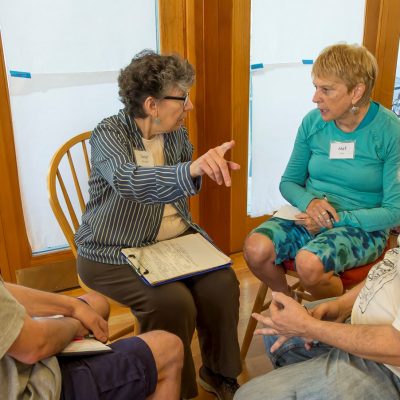
Recording Library - Communication
Cohousing communities depend on communication for everything from sharing resources to making decisions to resolving conflict. These sessions will share tips for doing it well.
Studies tells us that less than 20% of what is said actually gets heard by the listener. We’ll learn a simple (though not always easy) strategy for hearing each other more effectively and deepening our sense of connection.
High functioning communities are always a blend of head smarts and heart smarts. They know how to synergize IQ and EQ to tap into their collective intelligence, and harness their combined WeQ (group wisdom) by playing to people’s strengths, and pooling their resources.
In this enlivening keynote, motivational humorist Rob Peck points out that to really do “the coho math” core principles have to become common practices. Key steps include shifting from the Golden Rule to The Platinum Rule, persistently applying Stephen Covey’s 5th Habit (of Highly Effective People) and rigorously remembering a 9 word aphorism- Validate, Before You Advocate What You Want To Initiate (and for extra credit, a “complementary 6 letter acronym”; WHOOPS When Humans Overcome Obstacles, Providence Smiles!)
Find more about Rob’s work at Zestworks
The attendees will participate in structured sharing in groups of three and in the large group as a way to deepen relationships. We will explore different kinds of questions and structures, based on the work of Peter Block, Community: the Structure of Belonging,
that enable people to experience closeness with each other.
We join cohousing communities because we are looking for connection, but it can take a long time for us to move past “company manners” and begin to feel connected to our neighbors. In this WebChat Karen explains how using mirroring, a part of Imago Dialogue, can help us get connected faster. This, in turn makes our group more stable, our meeting more effective and our conflicts more productive.
Improving Communication for individuals and communities.
1. Individual Communication Skills
– goal is connection
– focus on hearing and understanding
– be aware of feelings and needs
– apply Non-Violent Communication
– practice
2. Community Practices for Communication
– have clear expectations
– orientation for new members
– designated facilitator with some skills
– clear email guidelines
– comment box
– communicate institutional memory
– transparency
– training
– social capital meetings
If ever there was a time to lean into our shared humanity, this is it. There is an African proverb that says “if you want to go fast, go alone. If you want to go far, go together.” Together, we can forge and strengthen connection and community in spite of our differences. We can listen better, communicate better, and understand better, even when we disagree. More than anything, this requires intention and the willingness to practice. Mary Gaylord is the Managing Partner of Living Room Conversations, an organization that has developed over 100 conversation guides on a variety of topics that can sometimes be challenging to talk about with friends, strangers, and even loved ones of differing backgrounds and political persuasions. Join us as Mary shares insights, inspiration, and practical ideas for initiating and nurturing healthy communication and connection with each other — even when it’s not easy!
Mosaic is a custom web application that is specifically designed to meet the online organizational needs of cohousing communities. The basics of Mosaic will be presented, followed by a roundtable discussion about how web apps could improve and meet community needs that aren’t currently being met.
Get more information about on the website Mosaic Websites for communities

